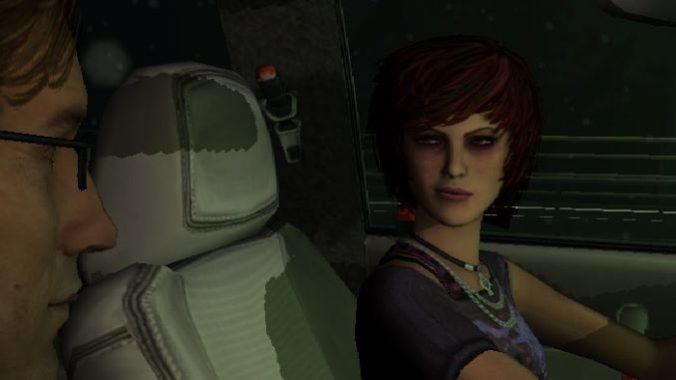Silent Hill: Shattered Memories—A Good Dad Is Hard To Define

This article contains spoilers for Silent Hill: Shattered Memories.
Memories aren’t real. We can’t take them out of our head, crystallize and make them manifest. They’re slippery and uncertain things. Like icicles, melting through our fingers.
The horror of impermanence has been at the heart of Silent Hill since its inception. Konami’s series trades in queasy uncertainty over buckets of blood or pop scares. It’s one of the reasons why love for the franchise has persisted through a series lull that just hit one decade in October. Yet when people talk about Silent Hill, it’s usually doublespeak. The Silent Hill most people remember are the first few entries. They’ve cast a long shadow on each subsequent entry, with fans of the initial quartet quietly ignoring or dismissing anything else that came out after.
In other words: nobody’s out here making Bogeyman or Asphysxia skate decks.
Lost in this shuffle most often is Crimson’s 2009 Wii entry, Silent Hill: Shattered Memories. It sits at a precarious place in the canon, being a sort-of remake of the first game, but otherwise totally original and distinct. Like the current glut of glitzy modern remakes, Shattered Memories sands off the edges of the aging PSOne title, in favor of making a more accessible and beatable experience for the average player.
Despite the mechanical overhauls, however, the most significant change to Shattered Memories is its presentation of the narrative. At the core, it’s similar—Harry Mason’s daughter goes missing in Silent Hill and he goes to find her. In the original game, Harry Mason is an unambiguous good guy—somebody players can graft themselves onto as they search for their videogame daughter. By contrast, Climax’s re-interpretation complicates uncritical fatherhood narratives by casting Harry as a problematic patriarch.
This is accomplished by the game’s framing device—first-person therapy sessions that break up the third-person exploration. After Harry has meandered through the frigid and hostile town enough, you enter the stagnant warmth of Dr. Michael Kauffman’s office. Kaufmann is menacing and invasive, presenting the player with loaded questions and casting doubt on their responses.
The big twist? These sections are actually from a grown up Cheryl’s perspective, now 25 and haunted by vague recollections of her father. Harry’s trip through Silent Hill is a Tommy Westphall situation. He’s a construction of Cheryl’s traumatized mind, which cast her father as a noble hero coming to save her. In reality, he died in a car crash in 1999, after a messy divorce that put a dark tinge on his daughter’s adolescence.
How good our fathers are is, sometimes, a selective construction. Odds are, our fathers have done objectively bad things at some point in their lives. My dad crashed an old Toyota pick-up—with me inside—into the car of my mom’s friend. Mom was in the throes of a BPD spiral after an ectopic pregnancy and dealing with a stalker. She needed new comfort, and this friend was that. But as she ran from my father, the weight of his own family’s abuse weighed on him. Blinded by anger, he had a momentary death spiral and thought that was the quickest way out.
My mom forgave him. He was going to get sentenced for child endangerment, and spent some time in jail. But I found this year—from her—that when it came time to testify against him, mom refused. So he got off, and moved back in with us. We moved around a while—from Las Vegas to Albuquerque to Winder—before settling back into Atlanta in 2005. Both parents began to spiral in tandem, but I saw it most from my dad’s end. He homeschooled me until I was 14, so we used to be a lot closer. Seeing mom was always a relief—a break from the norm. But even the cracks in her fun, nurturing demeanor even started to show.
Shattered Memories and its probing questions about family trauma defined a lot of my high school life. Most horror games up until that point I played for gross-out thrills and disturbing imagery. But this was one that felt personal—like it understood the trauma I was going through. By that point, my dad had cheated on my mom, and almost run off to start another family. My mom reacted with a persistent lie that she had stomach cancer for months, as her business partner robbed her blind and her husband’s family tried to have her locked up in a psych ward.